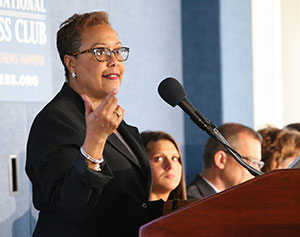10 Mar2014
By Sarah Pinsky
On February 27, the U.S. House subcommittee on elementary and secondary education and the subcommittee on higher education held a hearing titled “Exploring Efforts to Strengthen the Teaching Profession.”
Witnesses included Marcy Singer-Gabella, professor of the Practice of Education at Vanderbilt University (TN), along with two officials from state departments of education and the director of an alternative-route program.
30 Jan2014
By Sarah Pinsky
Today, AACTE released model state legislation to recruit high-achieving students into the teaching profession and incentivize them to teach in our neediest schools.
The Teaching Fellows bill is the first released by AACTE in its initiative to develop model state legislation that is aligned with AACTE’s state policy priorities and with the recommendations from “Excellent Teachers for Each and Every Child: A Guide for State Policy,” a joint effort by AACTE and several partner organizations that was released in December 2013. The initiative reflects AACTE’s goal of promoting sound education policies—grounded in research and practice—that will strengthen the teaching profession and will have a positive impact on students.
24 Jan2014
By Sarah Pinsky
Last week, President Obama signed an omnibus spending bill funding the government through the end of the fiscal year. This $1.1 trillion plan restores approximately two thirds ($1.6 billion) of the cuts made to the U.S. Department of Education in last year’s sequestration.
Perhaps most important to educator preparation programs, the omnibus maintains funding for Teacher Quality Partnership (TQP) grants, which fund partnerships between institutions of higher education and high-need school districts to create clinical and/or residency programs at the prebaccalaureate or graduate level. This means that the U.S. Department of Education will fund a new round of grants to partnerships seeking to reform teacher preparation programs. Stay tuned for more updates from AACTE on how to apply for this grant funding.
14 Jan2014
By Sarah Pinsky
The Education Task Force of the American Legislative Exchange Council (ALEC) met in Washington, DC, last month, considering two new model state bills: the “Student Achievement Backpack Act” and the “Course Choice Act.”
The “Student Achievement Backpack Act” creates a data “backpack” for each K-12 student in the state that would include an electronic learning profile as well as information on the student’s prior teachers, including teachers’ years of experience and licensure information. The act would also authorize parents and K-12 district employees to access these backpacks, which would be transferable between schools and districts. The bill does include provisions to safeguard students’ privacy.
19 Dec2013
By Sarah Pinsky
Recent budget cuts at the federal, state, and local levels are affecting the delivery of special education services for students with disabilities, according to a new survey conducted by the National Coalition on Personnel Shortages in Special Education and Related Services (NCPSSERS), of which AACTE is a member.
The survey of more than 1,000 special education professionals from all 50 states, which was featured in Education Week, shows that the impact of federal, state, and local budget cuts on special education is most evident in an increase in caseload, class size, and reduced professional development opportunities.
25 Nov2013
By Sarah Pinsky
Last summer in its 2013 Teacher Prep Review, the National Council on Teacher Quality (NCTQ) set forth recommendations for state and local policy makers who want to see the ratings increase for educator preparation programs in their jurisdictions. One of these recommendations was to “revamp current inspections of teacher preparation programs, performed as a condition of program approval.” Positing that neither state program approval site visits nor national accreditor site visits have proven to be meaningful, NCTQ recommended that states employ independent inspectors, along the lines of the British inspectorate model for preparation programs, to conduct program evaluation site visits and program evaluations.
14 Nov2013
By Sarah Pinsky and Valerie Fry

AACTE President Sharon P. Robinson speaks at the briefing
On November 8, AACTE marked the national launch of edTPA with a briefing in front of a standing-room-only audience at the National Press Club in Washington, DC. A report released at the briefing presents results of 2 years of field testing and recommends a passing score for edTPA, the first preservice performance-based assessment available to every educator preparation program across the country.
The briefing’s panelists—including a classroom teacher who completed edTPA in her preparation program, a teacher educator, state policy leaders, and edTPA partners—celebrated the new measure of teaching readiness as evidence that the teacher preparation profession is taking control of its future. Panelists said using edTPA as part of a multi-measure assessment system encourages continuous improvement by both candidates and programs, and it strengthens partnerships between the PK-12 community and teacher preparation programs. They also agreed that implementing the assessment with integrity will take time and the engagement of all stakeholders.
06 Nov2013
By Sarah Pinsky
In the last couple of weeks, many AACTE members have been contacted by the National Council on Teacher Quality (NCTQ) inviting them to submit new materials by December 15 for the council’s 2014 review of education schools.
Of note in NCTQ’s communication with members is that the 2014 review will be a ranking, rather than a rating, of programs, and that programs that don’t set a minimum GPA entry requirement can meet the selectivity standard by showing that the average GPA of admitted candidates is a 3.3 or higher.
AACTE will continue to support members’ decision-making regarding their engagement with NCTQ and to represent members’ concerns about the organization and the work it produces. Members can find materials, including AACTE’s statement on the release of NCTQ’s 2013 review, in the NCTQ-U.S. News resource section of AACTE’s web site.
28 Oct2013
By Sarah Pinsky
 Last month, I attended the North Carolina Association of Colleges for Teacher Education (NC-ACTE) Fall Forum, “Embracing the Future: Living and Learning in the Context of Globalization.” The conference had strands on technology, curriculum development, globalization, partnerships, and recruiting educators, as well as presentations from the state Department of Public Instruction and the North Carolina Teacher of the Year.
Last month, I attended the North Carolina Association of Colleges for Teacher Education (NC-ACTE) Fall Forum, “Embracing the Future: Living and Learning in the Context of Globalization.” The conference had strands on technology, curriculum development, globalization, partnerships, and recruiting educators, as well as presentations from the state Department of Public Instruction and the North Carolina Teacher of the Year.
One of the highlights of the conference was a keynote presentation from Yong Zhao, who spoke about the importance of the educator preparation profession to our democracy and to our economy. Zhao urged teacher educators to think bigger than scores on standardized tests—to prepare teachers who do more than train their students on employable skills, but who embrace diversity, curiosity, passion, and creativity. In Zhao’s words, “Without interest, you can get good science test scores, but you can’t get great scientists.”
18 Oct2013
By Jon Gentile and Sarah Pinsky
As you have surely heard, late Wednesday night lawmakers reached a deal to end the federal government shutdown and raise the debt ceiling. The shutdown lasted 16 days, and in the end Republicans agreed to a bill that looked almost identical to what they had rejected three weeks earlier: a debt-limit increase until February 7 and an extension of federal funding through January 15. The Republicans won only one minor victory—a report from the U.S. Department of Health and Human Services on the processes used for verifying the income of subsidy recipients under the newly established health-care exchanges.








 Last month, I attended the North Carolina Association of Colleges for Teacher Education (NC-ACTE) Fall Forum, “
Last month, I attended the North Carolina Association of Colleges for Teacher Education (NC-ACTE) Fall Forum, “